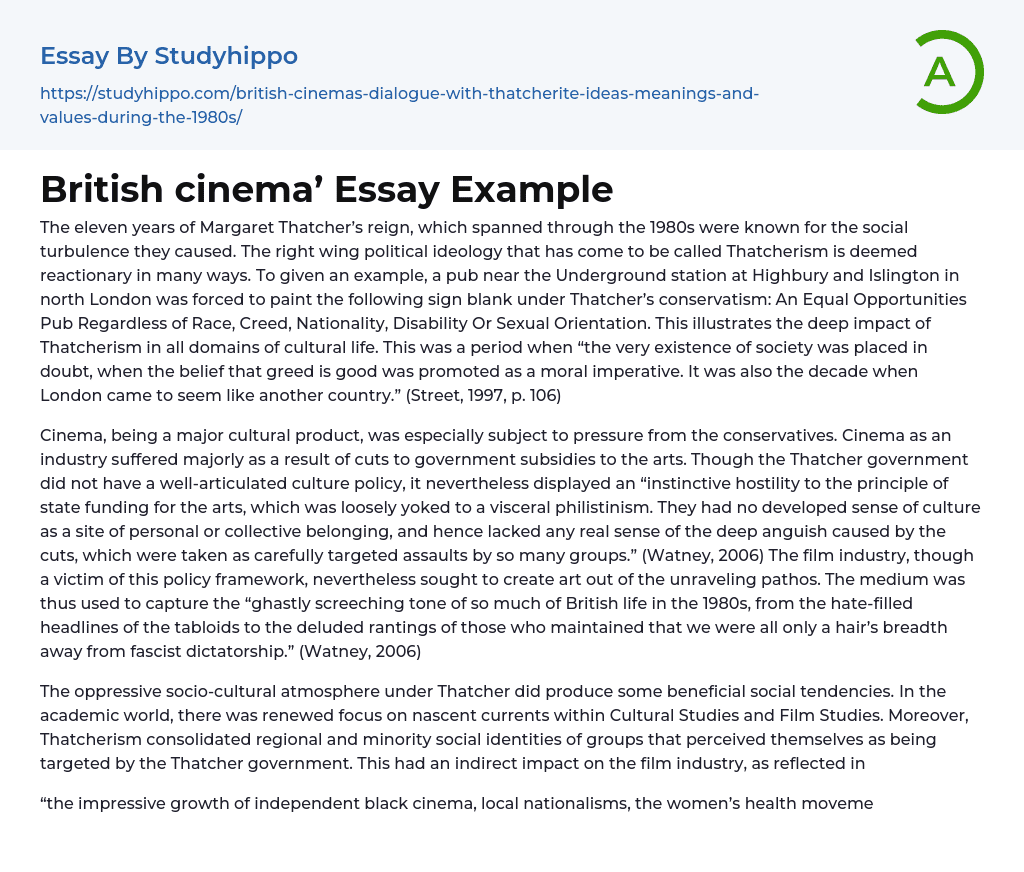During the 1980s, Margaret Thatcher's reign caused notable social turbulence. Her right-wing political ideology, known as Thatcherism, is considered reactionary in many ways. To illustrate this, a pub near Highbury and Islington Underground station in north London had to erase a sign under Thatcher's conservatism. The sign originally stated that the pub was an equal opportunities establishment, regardless of race, creed, nationality, disability, or sexual orientation. This demonstrates the widespread influence of Thatcherism on all aspects of cultural life. During this period, doubts were raised about the very existence of society, and the belief that greed is good was promoted as a moral imperative. Additionally, London became reminiscent of another country during this decade. (Street, 1997, p. 106)
Due to pressure from conservatives, cinema, as a major cultural product, was greatly affected b
...y cuts in government subsidies to the arts during the Thatcher era. The lack of a clearly defined cultural policy from the government led to a general disapproval of state funding for the arts, showing a disregard for the importance of culture as a source of personal and collective belonging. This resulted in deep distress caused by the targeted cuts among various groups. Despite being a victim of this policy, the film industry attempted to transform the unraveling pathos into art, capturing the disturbing atmosphere of British life in the 1980s. This ranged from the hateful headlines of tabloids to the deluded rants that suggested the country was on the verge of fascist dictatorship.
The oppressive socio-cultural atmosphere during the Thatcher era had some positive effects. In the academic realm, there was a renewed emphasis on emerging concepts within Cultural Studies and Film Studies. Additionally,
Thatcherism strengthened regional and minority social identities among groups that felt they were being singled out by the Thatcher government. This indirectly influenced the film industry, as seen in...
The growth of independent black cinema, local nationalisms, the women's health movement, and the gay response to HIV have led to numerous cinematic projects. These projects, including exhibitions, have faced criticism from populist politicians and newspaper editors seeking moralistic controversy and increased sales. (Watney, 2006)
The films of the 1980s aimed to portray the abrupt shift in the country's economy from industrial to financial. The film industry, already lacking support from the Thatcher government, faced a new dilemma. Previously, for the past two decades, the industry had operated under the belief that culture is beneficial. However, the new economic situation demanded examination of new issues. Cinema could no longer project the idea that the future would unquestionably be better than the past. All forms of art had to find fresh narratives and social puzzles. Cinema, too, confronted this challenge. Additionally, the introduction of Channel 4 brought a stimulating new influence to television and helped revitalize British cinema through its influential series called Film on 4. Furthermore, multiplex cinemas emerged later in the decade, effectively reversing a 30-year decline in cinema attendance that appeared unending. ("Golden Jubilee Special: 1980s," 2002, p. 16)
The success of Chariots of Fire can be attributed in part to the numerous stories that emerged from Thatcherism's hostile social policies. Other noteworthy films from this era include My Beautiful Laundrette by Hanif Kureshi and Stephen Frears, Meantime by Mike Leigh, and Made in Britain by David Leland. My Beautiful Launderette specifically explores the British Asian
experience during the 1980s within a Thatcherite context. Set against a backdrop of racism and a market-driven economy, the film centers around Omar, a young Pakistani man who manages his uncle's launderette. With the help of Johnny, a white punk, Omar transforms the struggling business into a thriving one. However, their personal success is marred by the presence of racism in Thatcher's Britain, as evidenced by an assault on the couple by racist punks (Street, 1997, p. 107).
The Ploughman’s Lunch, directed by Richard Eyre and written by novelist Ian McEwen, was the boldest in terms of confronting the Tory party. It took a scalpel to the contemporary Conservative Party itself. According to the "Golden Jubilee Special: 1980s" (2002, p. 16), The Ploughman’s Lunch is the most explicitly political film about Thatcherism in the 1980s. It tells the story of a BBC news editor (portrayed by Jonathan Pryce) attempting to publish a book on the Suez crisis while the Falklands crisis was escalating. The news editor faces difficulties in uncovering the truth from a past that has been falsified by accepting certain historical accounts over others, similar to the false propaganda during the Falkland crisis. The film boldly condemns the Thatcher government, associating these falsities with the 1980 Conservative Party Conference. The film's approach is not one of harmony but cacophony, dissent instead of consensus (Walker, 1985:264). Overall, The Ploughman’s Lunch stands out as an unusual and politically charged film.
“In its interweaving of fictional narrative events with their contemporary historical context: the micro-level is James’ quest about Suez, while the macro-level is undoubtedly Thatcherism. The viewer is therefore encouraged to arrive at political conclusions about the
film’s many dissenting elements: its portrayal of consumerism (the title alluding to the manufacture of the past), the world of television journalism and the Conservative Party under Thatcher. As one critic put it, The Ploughman’s Lunch ‘was about the exploitative, fraudulent, manipulative skills of the Eighties’.” (Walker, 1985:264).
- Collaboration essays
- Dialogue essays
- Fake News essays
- Journalism essays
- Mass Media essays
- Media Analysis essays
- Media Bias essays
- Media Studies essays
- Message essays
- News essays
- Propaganda essays
- Radio essays
- Rogerian Argument essays
- Role of Media essays
- Social Media essays
- Social Media Marketing essays
- Social Networking essays
- Youtube essays




